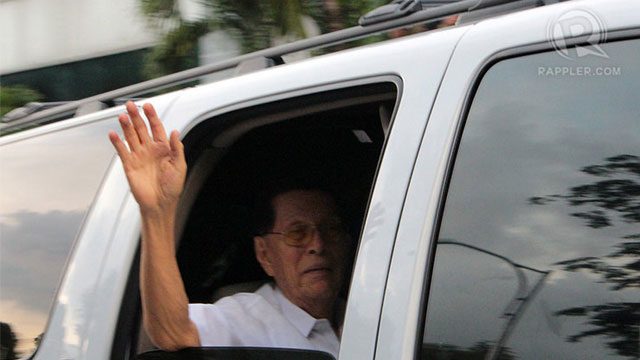SUMMARY
This is AI generated summarization, which may have errors. For context, always refer to the full article.

MANILA, Philippines – The Supreme Court has granted the request of detained Senator Juan Ponce Enrile to be provided with details of the plunder charges filed against him.
The Court, voting 8-5, partially granted Enrile’s petition which challenges the Sandiganbayan’s July 11, 2014 resolution denying his motion for a bill of particulars.
“The Court directed the Ombudsman to submit a bill of particulars providing the information to be contained in the court’s judgment. In light of the court’s action, petitioner Enrile is given the opportunity to confirm or change the plea that the Sandiganbayan entered for him, if he so wishes,” SC spokesman Theodore Te said on Tuesday, August 11.
Te added that the Ombudsman should provide the information within 10 to 15 days from receipt of the court’s order.
Those who voted to grant Enrile’s petition were Justices Presbitero J. Velasco Jr, Teresita J. Leonardo-De Castro, Arturo D. Brion, Diosdado Peralta, Lucas Bersamin, Jose Perez, Jose Mendoza, and Estela M. Perlas-Bernabe.
Those who dissented were Chief Justice Maria Lourdes Sereno, Senior Associate Justice Antonio Carpio, and Justices Mariano Del Castillo, Martin Villarama Jr, and Marvic Leonen.
Justice Bienvenido Reyes, who is on leave, took no part in the voting. Meanwhile, Justice Francis Jardeleza inhibited because he handled the case when he was Solicitor General.
The 91-year-old senator, who is currently under hospital arrest, faces plunder and graft charges over the pork barrel corruption scandal. The information, arraignment and warrant of arrest against Enrile however remain valid.
The High Court is expected to vote on the senator’s petition for bail next week.
Because the SC granted Enrile’s prayer for a bill of particulars, it will compel the prosecution to state charges against the senator with more specificity. This will help him to craft a more intelligent response to the claims and charges against him.
It essentially means the High Tribunal does not believe the charges against Enrile were as specific as they could have been.
Enrile and Senators Jinggoy Estrada and Ramon Revilla Jr are accused of diverting development funds to fake non-governmental organizations allegedly controlled by Janet Lim-Napoles in exchange for multi-million peso kickbacks.
In his August 2014 petition, Enrile asked the High Court to annul the July 2014 Sandiganbayan resolution denying his motion for a bill of particulars.
The move prompted Enrile not to enter any plea during his arraignment. (READ: Court enters ‘not guilty’ plea for Enrile)
Bluffing prosecution?
In his petition, Enrile said the 3rd division of the anti-graft court committed grave abuse of discretion by refusing to provide him with the facts and circumstances alleged in the charge sheet against him.
By doing so, Enrile said the Sandiganbayan not only denied him “a procedural right granted an accused under the Rules of Court, but of rights vested in an accused under the Constitution to assure fairness of the trial of the offense charged.”
His lawyer Estelito Mendoza earlier said that a bill of particulars will show if the prosecution is only bluffing with the charges against the detained senator.
Among the questions Enrile’s camp asked the court to order the prosecution to answer in the bill of particulars are:
- From whom and for what reason did he (Enrile) receive any money or property from the government through which he ‘unjustly enriched himself?’
- What was the overall plan? Who were parties to its conception? And to its implementation? When and how much did Napoles misappropriate for her personal gain?
- Who paid the money? Who received the money? When was the money paid? Where was it paid?
- What COA (Commission on Audit) audits or field investigations were conducted which validated the findings that each of Enrile’s PDAF projects in the years 2004-2010 were ghosts or spurious projects?
- Who paid Napoles, from whom did Napoles collect the fund for the projects which turned out to be ghosts or fictitious? Who authorized the payments for each project?
- What are each of the projects allegedly identified, how, and by whom was a project identified, the nature of each project, where it is located and the cost of each project? – with reports from Buena Bernal/Rappler.com
Add a comment
How does this make you feel?
There are no comments yet. Add your comment to start the conversation.